新人教版五年级英语下册各单元知识点汇总
人教版小学五年级英语下册重点知识归纳

Unit One My day 重点单词: eat breakfast吃早餐 have ⋯ class 上⋯课p lay sports 进行体育运动e xercise 活动,运动d o morning exercises做早操 eatdinner 吃晚饭c lean my room 打扫我的房间go for 啊 walk 散步 go shopping去买东西,购物t ake 学习,上课d ancing舞蹈 ,跳舞 take a dancing class 上舞蹈课w hen 什么时候重点句子 :1. When do you finish class in the morning? 你们上午的课几点结束 ?2. We finish class at 1 o’clock. 我们一点钟结束上午的课.3. What do you do on the weekend?你周末在做什么 ?4. I often watch TV and play ping-pong with my father. 我 ,也常和我爸爸一起球.口语交际: 一 A: When do you finish class in the morning? 你们上午的课 几点结束 ? B: We finish class at 1 o ’clock. Then we eat lunch at home. 一点结束。
然后我们回A: Wow! When do you go back to school after lunch? 午饭后几点到校?B: At 2:30. Classes start at 3 o ’clock. 两点半到校,三点上课。
A: When do you usually eat dinner in Spain? 在西班牙你们通常几点吃晚饭?B: Usually at 9:30 or 10 o ’clock. 通常在九点半或十点。
人教版小学五年级英语下册知识点汇总(完整版)

Unit1 My day 知识点总结一、语音cl — [cl] : clean classpl — [pl] : eggplant茄子 please play注意:cl 和 pl 放在词尾与 e 结合变为cle 和 ple 时发音不同.如people,apple。
二、词汇1、日常活动词汇do morning exercises(做早操)eat breakfast/lunch/dinner(吃早餐/午餐/晚餐)have...class(上…课)take a dancing class(上舞蹈课)play sports(做运动)go for a walk (散步)clean my room(打扫我的房间)go shopping(购物)2、其他词汇exercise 活动;运动 take学习;上(课)dancing跳舞;舞蹈when什么时候;何时 after在(时间)后 start开始(反义对应词finish完成)usually 通常地;惯常地 Spain 西班牙 late 晚;迟(反义对应词early早)why 为什么 a.m.午前;上午 p.m.午后;下午 shop去买东西;购物work 工作 last上一个的;刚过去的 sound听起来好像also 还;也busy 忙的need 需要play 戏剧剧本 letter 信Live 居住island 岛always 总是;一直 cave 山洞;洞穴go swimming 去游泳win 获胜。
三、句型以及语法知识点1、询问别人什么时候做某事某种活动的when特殊疑问句型,使用时间短语回答。
When do you do morning exercises? 你何时做早操?I do morning exercises at 7:00.我七点钟做早操。
When do you finish class in the morning? 你们上午的课到什么时候结束?We finish class at 1 o’clock.我们一点钟结束上午的课。
人教版小学英语五年级下册各单元知识点

人教版小学英语五年级下册各单元知识点Unit 1 At the zooVocabulary1.zoo 动物园2.cage 笼子3.lion 狮子4.elephant 大象5.giraffe 长颈鹿6.bear 熊7.monkey 猴子8.camel 骆驼9.kangaroo 袋鼠10.penguin 企鹅Sentence patterns1.询问动物去哪里了 Where is the lion/elephant/bear?2.描述动物在哪里There’s a lion/elephant/bear in the cage.3.描述动物是什么样的 What does the lion/elephant/bear look like?4.描述动物在做什么 The monkey is jumping./The camel is walking. Unit 2 My school dayVocabulary1.school day 学校日2.subject 学科3.math 数学4.English 英语5.science 科学6.PE 体育7.art 美术8.music 音乐9.Chinese 语文Sentence patterns1.询问你有哪些学科 What subjects do you have?2.询问你最喜欢的学科是什么What’s your favorite subject?3.描述你正在上什么学科I’m having math/English/science class now.4.询问你在哪个班级 What class are you in?Unit 3 At a partyVocabulary1.party 派对2.balloon 气球3.present 礼物4.birthday 生日5.cake 蛋糕6.candle 蜡烛7.card 卡片Sentence patterns1.询问你们在庆祝什么 What are you celebrating?2.询问你送了什么礼物 What present did you bring?3.描述蛋糕上有多少个蜡烛 There are four candles on the cake.4.描述你在派对上吃了什么 I ate cake and drank soda.Unit 4 My clothesVocabulary1.clothes 衣服2.jacket 夹克衫3.shirt 衬衫4.dress 连衣裙5.skirt 短裙6.pants 裤子7.socks 袜子8.shoes 鞋子Sentence patterns1.询问你喜欢穿什么样的衣服 What clothes do you like to wear?2.询问今天你穿了什么衣服 What clothes are you wearing today?3.描述你的外套是什么样的 My jacket is blue.4.描述你的鞋子是什么颜色的 My shoes are red.Unit 5 My familyVocabulary1.family 家庭2.mother 母亲3.father 父亲4.sister 姐妹5.brother 兄弟6.grandmother 奶奶7.grandfather 爷爷8.aunt 阿姨9.uncle 叔叔Sentence patterns1.询问你有几口人家庭 How many people are there in your family?2.询问你和家人一起住吗 Do you live with your family?3.描述你的妈妈是什么样的 My mother is kind.4.描述你和兄弟姐妹的关系很好 My sister and I get along well.。
最全最新人教版五年级英语下册知识点-五年级下册英语口诀

最全最新人教版五年级英语下册知识点-五年级下册英语口诀Unit 1 My day一、重点词汇。
1. 四会词汇:eat breakfast吃早饭have ·c·lass 上·课play sports 进行体育运动exercise 活动;运动do morning exercises 做早操eat dinner 吃晚饭clean my room 打扫我的房间go for a walk 散步go shopping 去买东西;购物take学习;上(课)dancing跳舞;舞蹈take a dancing class 上舞蹈课2. 三会词汇:when 什么时候after 在(时间)后start 开始usually 通常地;惯常地Spain 西班牙late 晚;迟a.m. 午前;上午p.m. 午后;下午why 为什么shop 去买东西;购物work 工作last 上一个的;刚过去的sound 听起来好像also 还;也busy 忙的need 需要play 戏剧;剧本letter 信live 居住island 岛always 总是;一直cave 山洞;洞穴go swimming 去游泳win 获胜二、其他日常活动。
get up 起床eat lunch吃午饭go to bed上床睡觉wash my face 洗脸wash my clothes 洗我的衣服watch TV 看电视play ping-pong 打乒乓球playthe pipa 弹琵琶go swimming 去游泳go running 去跑步do homework 做作业do kung fu 练武术play football 踢足球play basketball打篮球三、频度副词。
always总是,一直(100%)usually通常(80%)often 经常(60%)sometimes(30%)有时四、疑问词。
when 什么时候why 为什么五、重点句型。
人教版五年级英语下册 知识点总结

Unit 1 This Is My Day对话一:A: When do you get up ? 你什么时候起床啊?B: I usually get up at 6:30.When do you eat breakfast?A: At 6:20. What about you? / And you? 你呢?B: I usually eat breakfast at 7:00.对话二:A: Excuse me .Can I ask you some questions ? 打扰了,我能问你几个问题吗?B: Sure.A: What do you do ? 你是做什么的?B: I am a policeman .A: When do you go to work ? 你什么时候去上班?B: I usually go to work at 9:00 in the evening.A: When do you go home ?B: I go home at 5:00 in the morning .A: Thank you for telling me about your day.谢谢你告诉我你的一天。
B: You’re welcome.对话三:A: What do you do on the weekend ? 你周末干什么呀?B: Usually I watch TV and go shopping. Sometimes I visit my grandparents.What about you ? 我通常看电视和购物。
有时候去拜访我的祖父母。
你呢?A: I often play football . Sometimes I go hiking .B: That’s fun .好玩句型:1、询问某人的生活,学习规律——when do you +动词(短语)——I(usually)+动词(短语)+at + 时间.2、Excuse me . 用在打扰别人时的一种客气说法,意为:打扰了。
新人教版PEP 【小学五年级英语下册】 单元知识点 归纳总结

新人教版PEP 【小学五年级英语下册】单元知识点归纳总结Unit 1 My DayIn this unit。
we learn some core vocabulary words。
phrases。
and XXX.Core Vocabulary:1.Verbs: take (studying)。
go to (class)2.Nouns: dancing。
exercise。
sports3.Phrases: do morning exercises。
eat breakfast。
play sports。
eat dinner。
go for a walk。
go shopping。
clean my room。
take a dancing class。
have a classXXX Vocabulary:1.Verbs: start。
shop。
work。
need。
live。
win。
sound2.Nouns: Spain。
play。
letter。
island。
cave3.ns: after4.XXX: when。
XXX。
a.m。
p.m。
why。
last。
also。
busy5.nal Vocabulary: frequency adverbs (always。
usually。
sometimes)Phrases:watch TV。
eat lunch。
go to bed。
go swimming。
go home。
go to schoolCore Sentence Structure:When do you do morning exercises?" "At 7 o'clock."XXX phrase is "good job" to praise XXX.Which season do you like best。
I like winter best。
This sentence means "which one do you like the most" and "like。
人教版PEP小学英语五年级下册知识点汇总(最新)
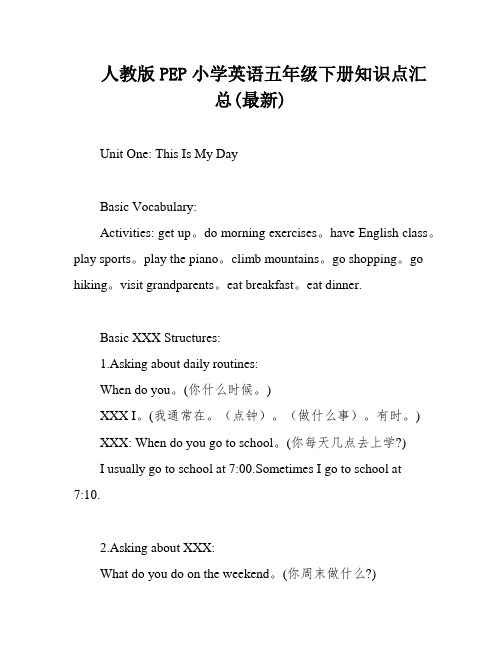
人教版PEP小学英语五年级下册知识点汇总(最新)Unit One: This Is My DayBasic Vocabulary:Activities: get up。
do morning exercises。
have English class。
play sports。
play the piano。
climb mountains。
go shopping。
go hiking。
visit grandparents。
eat breakfast。
eat dinner.Basic XXX Structures:1.Asking about daily routines:When do you。
(你什么时候。
)XXX I。
(我通常在。
(点钟)。
(做什么事)。
有时。
)XXX: When do you go to school。
(你每天几点去上学?)I usually go to school at 7:00.Sometimes I go to school at7:10.2.Asking about XXX:What do you do on the weekend。
(你周末做什么?)XXX I。
(我通常/经常。
有时。
)XXX: What do you do on the weekend?I often play XXX I go shopping with my mom.3.Introducing one's own habits:Every weekend。
I go hiking。
(我每个周末远足。
)Every day。
I do my homework at 8:00 in the evening。
(我每天晚上8点做作业。
)4.Asking XXX:What do you do。
(你是干什么的?)Time:morning。
afternoon。
evening。
noon。
at night。
6:00.on Sunday。
人教版新起点英语五年级下册全册单元知识点

Unit 1 Keep Healthy(保持健康)一、单元词汇too much 太多candy 糖果go to bed 去睡;就寝early 早exercise 锻炼tired 困倦的;疲倦的drink 喝;饮before 在......之前dirty 肮脏的always 总是stomachache 胃疼headache 头疼toothache 牙痛a lot of 大量;许多sleepy 困的;欲睡的subject 学科mark 分数advice 建议more 更多的二、单元句型1. A: What s wrong? 怎么了?B: I ve got a stomachache. 我肚子疼。
2. A: I often have stomachaches. What should I do?我经常肚子疼。
我应该怎么办?B: You should drink some water. 你应该喝些水。
3. Here you are. 给你。
4. A: Do you eat a lot of candy? 你吃了很多糖吗?B: Yes, I eat some after every class. 是的,我每节课后都吃很多。
5. You shouldn t eat too much candy. 你不该吃太多糖。
6. A: Do you wash your hands before eating? 你饭前洗手了吗?B: Not always. 不总洗。
7. You shouldn t eat with dirty hands. 你不该用脏手吃饭。
8. You should always wash your hands before eating.你应该坚持饭前洗手。
9. I always feel tired and sleepy. 我总觉得很累很困。
10. I have some advice for you. 我给你一些建议。
新人教版PEP五年级英语下册各单元知识点总结
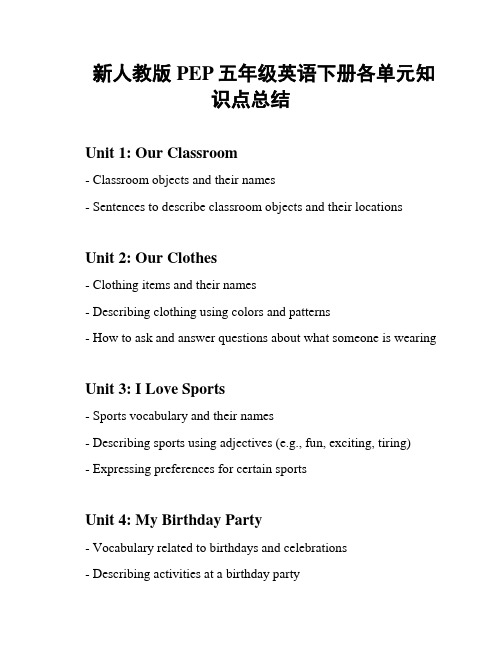
新人教版PEP五年级英语下册各单元知识点总结Unit 1: Our Classroom- Classroom objects and their names- Sentences to describe classroom objects and their locationsUnit 2: Our Clothes- Clothing items and their names- Describing clothing using colors and patterns- How to ask and answer questions about what someone is wearingUnit 3: I Love Sports- Sports vocabulary and their names- Describing sports using adjectives (e.g., fun, exciting, tiring)- Expressing preferences for certain sportsUnit 4: My Birthday Party- Vocabulary related to birthdays and celebrations- Describing activities at a birthday party- Expressing likes and dislikes about different party elementsUnit 5: At the Farm- Vocabulary related to farm animals and their names- Describing farm animals using adjectives (e.g., big, small, noisy) - Describing activities at a farm (e.g., feeding animals, milking cows)Unit 6: A Fun Day Out- Vocabulary related to amusement park rides and activities- Describing activities and experiences at an amusement park- Expressing likes and dislikes about different rides and activitiesUnit 7: A Friendly Letter- Vocabulary related to writing a letter (e.g., greeting, closing, signature)- Structure of a friendly letter- Writing a letter to a friend, describing personal experiences or activitiesUnit 8: Our Pets- Vocabulary related to pets and their names- Describing pets using adjectives (e.g., cute, friendly, playful)- Talking about responsibilities and caring for petsUnit 9: Our Earth- Vocabulary related to the environment and nature- Describing different natural elements (e.g., mountains, rivers, plants)- Expressing concerns and suggesting actions to protect the environmentUnit 10: Fun with Art- Vocabulary related to art and artistic activities- Describing different art forms (e.g., drawing, painting, sculpting) - Talking about personal preferences for different art activitiesUnit 11: Let's Travel- Vocabulary related to travel and transportation- Describing different modes of transportation (e.g., car, train, airplane)- Talking about travel experiences and preferences for different destinationsUnit 12: Healthy Habits- Vocabulary related to health and healthy habits- Describing different healthy habits (e.g., exercise, balanced diet, enough sleep)- Talking about personal choices and habits for a healthy lifestyle。
五年级下册人教版(PEP)英语第三单元知识点

五年级下册英语第三单元
Unit3My school calendar
考点:
1.十二个月份及月份前介词的使用
2.询问某个节日/某个活动/假期(节日前不加the)在什么时候句型
一.月份及介词的使用
一月January
二月February
三月March
四月April
五月May
六月June
七月July
八月August
九月September
十月October
十一月November
十二月December
在一月in January
在六月in June
在十月in October
在十二月in December
在什么时候句型
句型结构:
问:When is+节日/the活动/the假期?答:It's in+月份.
1.植树节是什么时候?在三月。
When is Tree Planting Day?
It’s in March.
2.今年的学校旅行是什么时候?在五月。
When is the school trip this year?
It’s in May.
3.英语派对是什么时候?在四月。
When is the English party?
It’s in April.
4.圣诞节是什么时候?在十二月。
When is Christmas?
It’s in December.
5.国庆节在什么时候?在十月。
When is National Day?
It’s in October.。
人教版五年级英语下册全册知识点总结

千里之行,始于足下。
人教版五年级英语下册全册知识点总结人教版五年级英语下册总结1. 词汇:- 人称代词:I, you, he, she, it, we, they- 动词:be动词 (am, is, are), 常见动词 (like, have, go, do, see, eat, play)- 数字:1-1000- 家庭成员:father, mother, brother, sister, grandfather, grandmother- 学科名称:English, Chinese, math, science, P.E., music, art - 学习用品:book, pencil, eraser, ruler, sharpener, bag- 季节:spring, summer, autumn, winter- 食物:rice, noodles, bread, eggs, milk, fruits, vegetables - 动物:dog, cat, bird, fish, rabbit, panda, monkey- 蔬菜:carrot, tomato, potato, cabbage, cucumber, onion- 水果:apple, banana, orange, pear, grape, strawberry2. 句型:- What's your name?/My name is...- How old are you?/I'm ... years old.- Where are you from?/I'm from ...- What do you like?/I like ...- Can you ...?/Yes, I can./No, I can't.- What's the date today?/Today is ...- What's the weather like?/It's ...- Do you have ...?/Yes, I do./No, I don't.第1页/共2页锲而不舍,金石可镂。
(完整版)人教版PEP五年级下册英语知识点复习总结
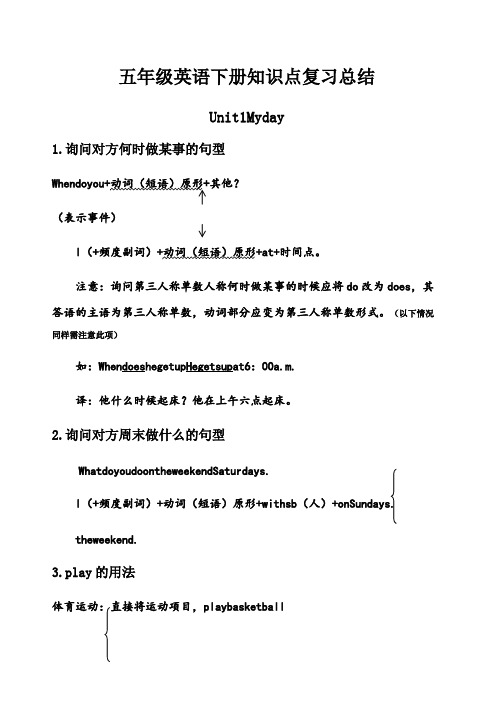
五年级英语下册知识点复习总结
Unit1Myday
1.询问对方何时做某事的句型
Whendoyou+动词(短语)原形+其他? (表示事件)
I(+频度副词)+动词(短语)原形+at+时间点。 注意:询问第三人称单数人称何时做某事的时候应将 do 改为 does,其 答语的主语为第三人称单数,动词部分应变为第三人称单数形式。(以下情况
同样需注意此项)
如:WhendoeshegetupHegetsupat6:00a.m. 译:他什么时候起床?他在上午六点起床。
2.询问对方周末做什么的句型
WhatdoyoudoontheweekendSaturdays. I(+频度副词)+动词(短语)原形+withsb(人)+onSundays. theweekend.
(2)在基数词后加 th:除去 first,second,third,其他基数词变序数词一般 直接在其后加 th。注意 five 与 twelve 要先把 ve 变 f,再加 th;eight 直接加 h;nine 去 e 再加 th。
(3)整十序数词以 ieth 结尾:整十位的序数词先将十位整数词尾的 y 变为 i, 再加 eth。如:twenty-twentieth。
The
注意:play-plays 因为 a 是元音 3)以 ch,sh,s,x 或 o 结尾的动词,在后面加-es; 例如 teach-teacheswash-washesdo-doesgo-goesfix-fixes
4)不规则的; 例如 have-has
5.by 的用法
五年级下册英语六个单元的,知识
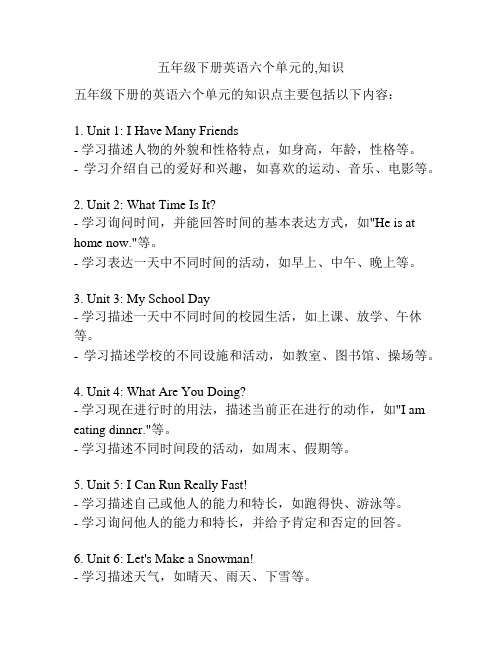
五年级下册英语六个单元的,知识
五年级下册的英语六个单元的知识点主要包括以下内容:
1. Unit 1: I Have Many Friends
- 学习描述人物的外貌和性格特点,如身高,年龄,性格等。
- 学习介绍自己的爱好和兴趣,如喜欢的运动、音乐、电影等。
2. Unit 2: What Time Is It?
- 学习询问时间,并能回答时间的基本表达方式,如"He is at home now."等。
- 学习表达一天中不同时间的活动,如早上、中午、晚上等。
3. Unit 3: My School Day
- 学习描述一天中不同时间的校园生活,如上课、放学、午休等。
- 学习描述学校的不同设施和活动,如教室、图书馆、操场等。
4. Unit 4: What Are You Doing?
- 学习现在进行时的用法,描述当前正在进行的动作,如"I am eating dinner."等。
- 学习描述不同时间段的活动,如周末、假期等。
5. Unit 5: I Can Run Really Fast!
- 学习描述自己或他人的能力和特长,如跑得快、游泳等。
- 学习询问他人的能力和特长,并给予肯定和否定的回答。
6. Unit 6: Let's Make a Snowman!
- 学习描述天气,如晴天、雨天、下雪等。
- 学习描述不同季节的活动和变化,如春天、夏天、秋天、冬天等。
以上是五年级下册英语六个单元的主要知识点概述,具体的知识点还包括词汇、语法和句型等。
新人教版五年级下册英语知识点汇总

五年级下册英语第一单元知识点整理1、主要单词和短语:do morning exercises 晨练,做早操eat breakfast 吃早饭have En glish class 上英语课eat dinner 吃晚饭play sports 进行体育活动eat lunch 吃午饭climb mountains 爬山go shopp ing 购物,买东西play the pia no 弹钢琴visit gran dpare nts 看望(外)祖父母go hiki ng 去远足二、主要句子:Whe n do you eat dinner? 你什么时候吃晚饭? 1 eat dinn er at 7:00 in the evening我晚上七点吃晚饭。
Whe n do you get up? 你什么时候起床?I usually get up at 12:00 at noon. 我通常在中午12点起床。
What do you do on the weeke nd? 你在周末干什么?Usually I watch TV and go shopp ing. 我通常看电视和购物。
I ofte n play football. 我经常踢足球。
Sometimes I go hiki ng. 有时候我去远足。
三、重要知识点同义词:eat breakfast-havebreakfast , eat lun ch-have lun ch, eat dinn er-have dinner play sports-do sports, usually-ofte n复数形式:policema n-policeme n policewoma n-policewome n现在分词:tell-telli ng第三人称单数:say-says同义句:What do you do ? ---What are you? 你是干什么的?表示频度的副词:always总是,一直;usually通常,常常;often 经常; sometimes有时候以复数形式出现的词组:visit gran dpare nts ,pla nt trees介词后跟表示时间的词语时,表示在某年、某月]、某个季节,某个时候(在上午,在下午,在晚上)用in;表示在某天,在星期几用on,在具体的几点几分用at.too和either的用法区别:too和either都是也的意思,但too用于肯定句,either用于否定句。
人教版PEP五年级英语下册各单元语法点

人教版PEP五年级英语下册各单元语法点Unit 1: What Does She Do?- 一般现在时:用于描述日常活动或惯。
主语为第三人称单数时,动词加-s或-es。
- 观察寻找规律:第三人称单数的动词加-s或-es。
- Be动词+动词-ing:用于描述正在进行的动作。
主语为第三人称单数时,be动词用is。
- 一般现在时的否定句:在动词前面加don't/doesn't。
- 一般现在时的疑问句:将do/does置于主语之前。
Unit 2: Can You Run?- Can的用法:用于表示能力和询问对方是否能够做某事。
- Can的否定形式:在can后面加not或缩略形式can't。
- Can的疑问形式:将can置于句首。
Unit 3: What Are They Doing?- 现在进行时:用于描述正在进行的动作。
动词加-ing。
- 现在进行时的否定句:在be动词后面加not。
- 现在进行时的疑问句:将be动词置于句首。
Unit 4: I'm Sitting at the Front.- 介词短语表示地点:用于描述人或物所在的位置。
- 介词on、in、under、behind、in front of、next to等的用法。
Unit 5: What Are You Going to Do?- be going to的用法:表示将来要做的事情。
- be going to的否定形式:在be动词后面加not。
- be going to的疑问形式:将be动词置于句首。
Unit 6: It's Raining!- 祈使句:用于表示请求、命令或建议。
动词原形作谓语。
- 祈使句的否定形式:在动词前面加don't。
- 祈使句的疑问形式:用Do开头。
Unit 7: How Often Do You Exercise?- 表示频率的副词:用于描述动作发生的频率。
- always, usually, often, sometimes, hardly ever, never等的用法。
人教版五年级英语下册全册知识点总结
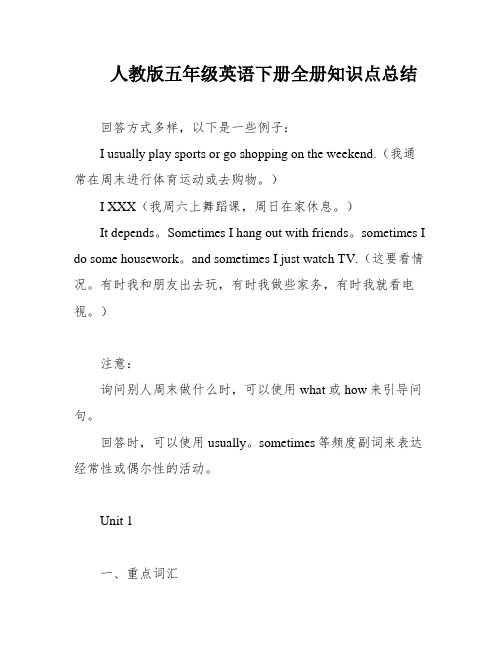
人教版五年级英语下册全册知识点总结回答方式多样,以下是一些例子:I usually play sports or go shopping on the weekend.(我通常在周末进行体育运动或去购物。
)I XXX(我周六上舞蹈课,周日在家休息。
)It depends。
Sometimes I hang out with friends。
sometimes I do some housework。
and sometimes I just watch TV.(这要看情况。
有时我和朋友出去玩,有时我做些家务,有时我就看电视。
)注意:询问别人周末做什么时,可以使用what或how来引导问句。
回答时,可以使用usually。
sometimes等频度副词来表达经常性或偶尔性的活动。
Unit 1一、重点词汇吃早餐:eat breakfast 上······课:have。
class进行体育运动:play sports做早操:do morning exercises 打扫我的房间:clean my room 去购物:go shopping舞蹈:dancing上午:a.m.通常地:usually二、其他日常活动起床:get up上床睡觉:go to bed活动,运动:exercise吃晚饭:eat XXX散步:go for a walk研究,上(课):XXX上舞蹈课:take a dancing class下午:p.m.吃午饭:eat XXX洗脸:XXX洗我的衣服:XXX看电视:watch TV打乒乓球:play ping-pong弹琵琶:play the pipa去游泳:go swimming去跑步:go running做作业:do homework练武术:do XXX踢足球:play football打篮球:play basketball三、语音cl→ [cl]:clean。
最新PEP人教版小学英语五年级下册单元知识清单总结(全册)
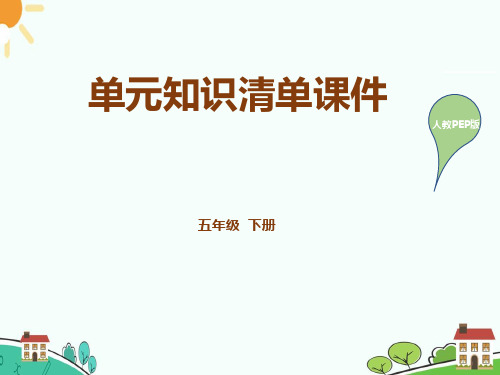
五、第八、第九、 第十二变化不规则外,其 余均在基数词后加上-th即可。 ② 20~90的序数词的构成方法是将基数词的词 尾 -y 变成i再加-eth. ③ 几十几的序数词,只需把个位数变成序数词, 十位数不变。
英语 人教PEP版 五年级下册 Unit 1
英语 人教PEP版 五年级下册 Unit 1
例如: —When does he do sports?
他什么时候做运动? —He usually plays sports after school.
他通常放学后做运动。 ☆询问时间的其他句型: What time+do/does+主语+动词原形+其他? 例如:What time do you read English?
单元知识清单课件
人教PEP版
五年级 下册
英语 人教PEP版 五年级下册 Unit 1
Unit 1 单元重难点
1.【原文呈现】 When do you finish class in the morning? 你们上午的课到几点结束? 【句型结构】 “When+助动词+sb+动词原形+其他?” 用来询问某(些)人做某事的时间。
—I usually climb mountains. 我通常爬山。
英语 人教PEP版 五年级下册 Unit 1
【情景再现】 每个人都有自己的周末安排。来看一下Mike和
Amy的周末计划吧! Mike:Hello, Amy! What do you do on the weekend? Amy:I usually play the piano. Mike:Oh, that’s good. When do you usually play
新人教版小学英语五年级下册1-2单元知识点复习
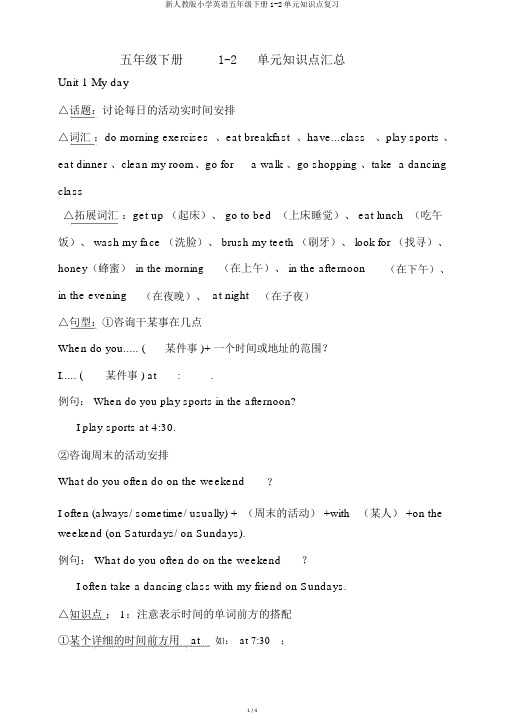
五年级下册1-2 单元知识点汇总Unit 1 My day△话题:讨论每日的活动实时间安排△词汇:do morning exercises 、eat breakfast 、have...class 、play sports 、eat dinner 、clean my room、go for a walk 、go shopping 、take a dancing class△拓展词汇:get up (起床)、 go to bed (上床睡觉)、 eat lunch (吃午饭)、 wash my face (洗脸)、 brush my teeth (刷牙)、 look for (找寻)、honey(蜂蜜)in the morning (在上午)、 in the afternoon (在下午)、in the evening (在夜晚)、at night (在子夜)△句型:①咨询干某事在几点When do you..... ( 某件事 )+ 一个时间或地址的范围?I..... ( 某件事 ) at ___:_____.例句: When do you play sports in the afternoon?I play sports at 4:30.②咨询周末的活动安排What do you often do on the weekendI often (always/ sometime/ usually) +(周末的活动) +with (某人) +on the weekend (on Saturdays/ on Sundays).例句: What do you often do on the weekend?I often take a dancing class with my friend on Sundays.△知识点: 1:注意表示时间的单词前方的搭配①某个详细的时间前方用at如:at 7:30;②在周末 weekend的前方则用 on 而且加 the 如: on the weekend ;但在礼拜几前方用on 而且不加 the 如: on Saturday ;③在 morning 、afternoon 、evening 前方用 in ,而且加 the 如:in the morning ;④在 night前方用at如:at night。
人教版小学五年级下册英语知识点复习
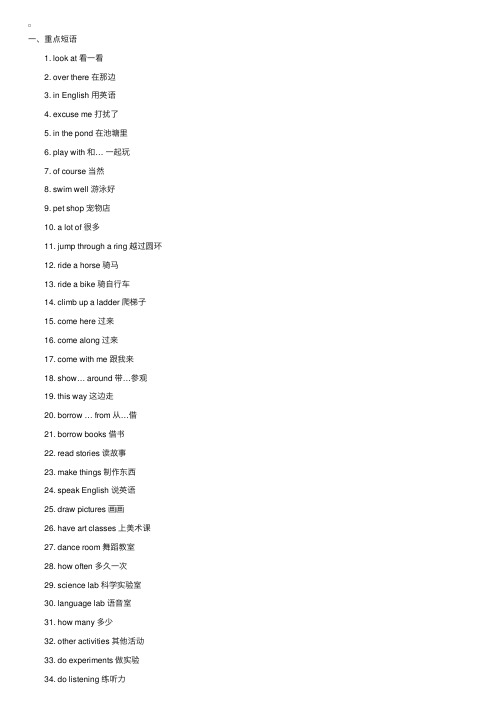
⼀、重点短语 1. look at 看⼀看 2. over there 在那边 3. in English ⽤英语 4. excuse me 打扰了 5. in the pond 在池塘⾥ 6. play with 和… ⼀起玩 7. of course 当然 8. swim well 游泳好 9. pet shop 宠物店 10. a lot of 很多 11. jump through a ring 越过圆环 12. ride a horse 骑马 13. ride a bike 骑⾃⾏车 14. climb up a ladder 爬梯⼦ 15. come here 过来 16. come along 过来 17. come with me 跟我来 18. show… around 带…参观 19. this way 这边⾛ 20. borrow … from 从…借 21. borrow books 借书 22. read stories 读故事 23. make things 制作东西 24. speak English 说英语 25. draw pictures 画画 26. have art classes 上美术课 27. dance room 舞蹈教室 28. how often 多久⼀次 29. science lab 科学实验室 30. language lab 语⾳室 31. how many 多少 32. other activities 其他活动 33. do experiments 做实验 34. do listening 练听⼒ 35. observe things 观察事物 36. do speaking 练⼝语 37. New Year’s Day 元旦 38. meeting hall 会议⼤厅 39. Children’s Day ⼉童节 40. be good at 擅长 41. be interested in 对…感兴趣 42. music club ⾳乐俱乐部 43. no one 没有⼈ 44.play the violin 拉⼩提琴 45. art club 美术俱乐部 46. come into 进⼊ 47.listen to music 听⾳乐 48. cut out 剪下 49. come from 来⾃ 50. up and down 上上下下 51. in groups 成组 52. science corner 科学⾓ 53. group work ⼩组活动 54. do project work 做项⽬制作 55. art corner 美术⾓ 56. computer corner 电脑⾓ 57.play football 踢⾜球 58. be famous for 因…闻名 59. study plants and animals 研究动植物 60. do exercises 做运动 61. on the field 在操场上 62. do printing on the paper 在纸上印刷 63. how about …怎么样? 64.go on field trips ⽥野考察 65. play volleyball 打排球 66. play basketball 打篮球 67. play hockey 打曲棍球 68. play rugby 打橄榄球 69. in the forest 在森林⾥ 70. have a look at 看⼀看 71. here you are 给你 72. how much 多少(钱) 73. a pair of ⼀双;⼀对 74. try on 试穿 75. shoe shop 鞋店 76. clothes shop 服装店 77. make a shopping list 做购物单 78. sports shop 体育⽤品商店 79. cake shop 蛋糕店 80. pay for 付钱 81. feel well 感觉好 82. see a doctor 看医⽣ 83. take good care of 好好照顾 84. have a bad cold 得了重感冒 85. have a fever 发烧 86. have a stomachache 胃疼 87. have a headache 头疼 88. have a toothache ⽛疼 89. have a cough 咳嗽 90. go to a concert 听⾳乐会 91. do maths problems 做数学题 92. go to the music club 去⾳乐俱乐部 93. have to 不得不 94. stay in bed 待在床上 95. get well 康复 96. be worried about 担⼼ 97. don’t worry 别担⼼ 98.help … with 帮助…做某事 99. in the hospital 在医院⾥ ⼆、重点短语讲解 1. play with 和…⼀起玩 play with sb.(某⼈) 和…⼀起玩 play with sth.(某物) 玩某物 e.g. Lucy and Lily are playing with their mother. Lucy and Lily are playing with their doll. 2. a lot of 很多 a lot of = lots of + 可数名词复数或不可数名词 e.g. 同义句转换 There are a lot of apples on the table. = There are ______ ______ apples on the table. (答案:lots of) 3. how often 多久⼀次 how often 是⼀个特殊疑问词,就频率提问。
- 1、下载文档前请自行甄别文档内容的完整性,平台不提供额外的编辑、内容补充、找答案等附加服务。
- 2、"仅部分预览"的文档,不可在线预览部分如存在完整性等问题,可反馈申请退款(可完整预览的文档不适用该条件!)。
- 3、如文档侵犯您的权益,请联系客服反馈,我们会尽快为您处理(人工客服工作时间:9:00-18:30)。
新人教版五年级英语下册各单元知识点汇总Unit 1 My day一、重点词汇。
1.四会词汇:eat breakfast吃早饭 have···class 上······课 play sports 进行体育运动 exercise 活动;运动 domorning exercises做早操 eat dinner吃晚饭 clean my room 打扫我的房间 go for a walk 散步 go shopping 去买东西;购物 take学习;上(课) dancing跳舞;舞蹈 take a dancing class 上舞蹈课2. 三会词汇:when什么时候 after 在(时间)后 start 开始 usually 通常地;惯常地 Spain 西班牙 late 晚;迟 a.m. 午前;上午 p.m. 午后;下午 why 为什么 shop 去买东西;购物 work 工作 last 上一个的;刚过去的sound 听起来好像 also 还;也 busy 忙的 need 需要 play 戏剧;剧本 letter 信 live 居住island 岛 always 总是;一直 cave 山洞;洞穴 go swimming 去游泳 win 获胜二、其他日常活动。
get up起床 eat lunch吃午饭 go to bed 上床睡觉wash my face洗脸 wash my clothes 洗我的衣服 watch TV看电视 play ping-pong打乒乓球 playthe pipa弹琵琶 go swimming去游泳 go running去跑步 do homework 做作业 do kung fu练武术 play football踢足球 play basketball打篮球三、频度副词。
always总是,一直(100%) usually通常(80%) often 经常(60%) sometimes (30%)有时四、疑问词。
when什么时候 why 为什么五、重点句型。
1、询问别人什么时候做某事的句型及回答。
句型结构:问:When do you+动词短语原形+其他?(你/你们什么时候做某事?)答:I/We(+频度副词)+动词短语原形+at+具体时间(我/我们通常在几点做某事。
)例:问:When do you go to bed?(你什么时候上床睡觉?)答:I go to bed at 9:00p.m (我晚上9点上床睡觉。
)注意:当主语是第三人称单数(he,she,it,单个人名或单数名词)时,助动词do要变成does,句型结构是:When does+主语(第三人称单数)+动词短语原形+其他?2、询问别人周末做什么的句型及回答。
句型结构:问:What do you do on theweekend?(你周末做什么?)答:I(+频度副词)+动词(短语)+其他。
例:问:What do you do on theweekend?(你周末做什么?)答:I usually read books. (我通常看书。
)注意:当主语是第三人称单数(he,she,it,单个人名或单数名词)时,助动词do要变成does,句型结构是:What does+主语(第三人称单数)+do+on the weekend?六、四会句子:When do you finish class in the morning ? 你们上午的课到几点结束?We finish class at 1 o’clock . 我们一点钟结束上午的课。
What do you do on the weekend ? 你周末做什么?I often watch TV and play ping-pong with my father . 我经常看电视,也常和我爸爸一起打乒乓球。
Unit 2 My favourite season一、重点词汇1. 四会:spring 春天 summer 夏天 autumn秋天 winter冬天 season季节 picnic野餐 goon a picnic 去野餐 pick摘;采集 pick apples摘苹果 snowman雪人 make a snowman 堆雪人 go swimming去游泳2. 三会:which哪一个 best最;最高程度地snow 雪good job 做得好because 因为 vacation 假期 all 全;完全 pink 粉色;粉色的 lovely可爱的;美丽的 leaf叶子(复数leaves) fall 落下;(美式)秋天 paint 用颜料绘画二、其他1、形容天气的形容词 hot 炎热的 warm暖和的 rainy多雨的 windy 多风的 cold 寒冷的 cool凉爽的 sunny晴朗的 cloudy 多云的 snowy下雪的2、由go构成的活动短语 go swimming去游泳 go shopping去购物 go boating去划船 go skating去滑冰 gohiking去远足 go fishing去钓鱼三、重点句型1、询问别人天气怎么样的句型及回答。
句型结构:问:What’sthe weather like+时间+地点?(······天气怎么样?)答:It’s+表示天气的形容词例:问:What’s the weather like in winter in Beijing?(北京冬天的天气怎么样)答:It’s cold and windy.(有风而且寒冷。
)2、询问别人最喜欢的季节句型及回答。
句型结构:问:Which season do you likebest? (你最喜欢的季节是哪一个?)答:I like+季节+best或直接说季节名称。
同义句还有:What’s your favourite season?3、询问别人喜欢某个季节的原因的句型及回答。
句型结构:问:Why do you like+季节名称?或直接用“Why”来提问。
答:一般要用“because”引导的句子来说明理由,可以从天气相关的活动等方面来说。
例:问:Why do you likespring?(你为什么喜欢春天?)答:Because I can fly kites.(因为我能放风筝。
)问:Why do you like summer?(你为什么喜欢夏天?)答:Because I can go swimmingeveryday.(因为我每天都能去游泳。
)问:Why do you like autumn?(你为什么喜欢秋天?)答:Because the weather is cool.(因为天气凉爽。
)问:Why do you like winter?(你为什么喜欢冬天?)答:Because I can make a snowman.(因为我能堆雪人。
)四、句子Which season do you like best , Mike ? 迈克,你最喜欢哪个季节?Winter . 冬天。
Why ?为什么? Because I like summervacation ! 因为我喜欢暑假!Unit 3 My school calendar一、重点词汇1.四会:January(Jan.)一月 February(Feb.)二月 March(Mar.)三月 April(Apr.)四月 May 五月 June(Jun.)六月July(Jul.)七月 August(Aug.)八月 September (Sept.)九月October(Oct.)十月 November(Nov.) 十一月 December(Dec.)十二月2. 三会:few 不多;很少 a few一些 thing事情 meet 聚会;开会 sports meet 运动会 Easter 复活节trip 旅行 year 年plant 种植contest 比赛;竞赛theGreat Wall 长城national 国家的National Day 国庆日 American 美国的Thanksgiving 感恩节Christmas 圣诞节 holiday 假日;节日 game 游戏 roll 滚动 lookfor 寻找 chocolate 巧克力bunny (用作儿语)兔子RSVP (尤用于请柬)请赐复 by在...... 之前注意:1、月份的首字母一定要大写。
2、May没有缩写形式,September的缩写形式是“Sept.”,其他月份单词的缩写形式都是有单词的前三个字母加“·”构成。
3、月份的缩写形式不用在句子中,只能单独使用。
4、表示“在几月”时,要在月份单词前面加介词in, 但在几月几日用on。
二、常用节假日名称。
New Year’s Day元旦(1.1) Tree Planting Day 植树节(3.12) Easter 复活节April Fool’s Day愚人节(4.1) May Day 劳动节(5.1)Mother’s Day母亲节(每年五月的第二个星期天)Children’s Day 儿童节(6.1) Father’s Day父亲节(每年六月的第三个星期天)Teachers’ Day教师节(9.10)China’s National Day国庆节(10.1)Mid-Autumn Day 中秋节(农历八月十五)Thanksgiving Day 感恩节(11月第4个周四) Christmas圣诞节(12.25)summer vacation暑假 winter vacation寒假三、活动名称sports meet 运动会 Easterparty 复活节聚会 school trip 学校旅行 Chinese test 语文测试 singingcontest歌咏比赛 birthday party生日聚会四、介词in 、on、 at的用法。
1、in后面+上午/下午/晚上/月份/季节/年份。
如:inthe morning, in April, in winter, in 2015.2、on的后面+具体的某一天。
如:onMonday, on April 3rd, on Friday morning.3、at后面+具体的时间点或与其他词构成固定搭配。
如:at six o’clock, at 12:30,at noon.五、重点句型。
1、问答某个活动或节日在几月份的句型及回答。
句型结构:问:When is+活动或节日名称?答:It’s in+月份。
例:问:When is Christmas?(圣诞节在什么时候?)答:It’s in December.(在十二月。
